Ongoing gold prospecting adventure in Northern California.
Check it out at http://on.fb.me/1fyxz8R
Ongoing gold prospecting adventure in Northern California.
Check it out at http://on.fb.me/1fyxz8R
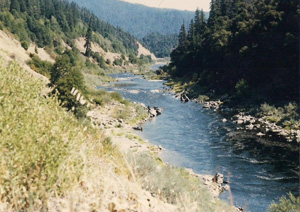
Middle Independence Gold Claim is the richest section of the entire Klamath River!
Two friends and I began dredging for gold on Josephine Creek in southern Oregon the day after Christmas in 1979. We should have waited until the spring thaw, but we were young and full of motivation. Conditions were miserable, and we paid a heavy price going out every day in 35-degree water. We didn’t have a clue about how to trace down high-grade gold deposits. We were sleeping in a 5-man summer tent. It was cold, cold,cold! We had to thaw out our dry-suits in front of a campfire in the morning to keep the frozen rubber from breaking and causing leaks. Our camp got fully flooded by the river in the middle of the night because of heavy rain. A lot of things went wrong. We only found a little gold. But none of that deterred us.
The three of us immigrated over to the Trinity River in northern California in mid-February of 1980. This was because someone told us there was a major gold rush going on over there. People supposedly were just picking big gold nuggets right off the stream banks. But we didn’t find anybody doing any mining over there during the winter months. The river water was 34 degrees! While our dry-suits more or less kept the cold water out, face exposure to the freezing water gave us headaches so bad that we wanted to vomit. Hand exposure made our fingers burn just as if we stuck them in the campfire! It was absolutely miserable. My partners gave it up before the spring thaw. They believed there were much easier ways to make a living; and of course, they were totally right!
We had met other guys on the Trinity that were supporting themselves from the gold they dredged during the summer months. They actually lived in houses! They were talking about sampling for hard-packed streambeds. They were talking about lines of gold and pay-streaks. This was music to my ears! Encouraged about their stories of recovering multiple ounces of gold per day in the river, I stuck it out in the forest, living by myself in a tent about a mile below the small community of Del Loma on the Trinity River. It was pretty rough. I look back at those times now with fondness. But at the time, it felt like I had reached the bottom of my life.
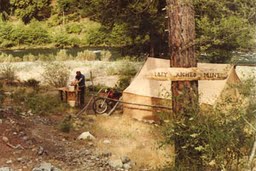
It was all about the basic necessities in those days!
I had figured out enough by the spring of 1980 that I was just barely supporting myself with a 6-inch dredge. I say just barely, because I had virtually no expenses except for the food I was eating (which was plenty), fuel for my dredge and motorcycle, and some minor upkeep. It didn’t take much gold to keep me going. My living space eventually evolved into a larger timberline tent made of canvas, including a wood stove for heat during the winter months. That was a huge upgrade in my standard of living!
I dredged by myself through the summers and winters of 1980 and 1981. There were times that the water in the Trinity dropped to 33 degrees. It was absolutely miserable! But by then, I had figured out how to trace down the lower-grade gold deposits, and I was building up a savings in gold which I kept in a safety deposit box at Bank of America in the nearby town of Weaverville.
I didn’t allow myself the luxury of an automobile until the fall of 1981. It was a pretty used up Jeep Wagoneer that had an oil leak which I never was able to repair, as many times as I tried. Anytime I got the car going faster than 50 miles an hour, all at once, the oil would drain from the motor out the rear main seal. So I drove slowly, and I brought plenty of extra oil along. The Wagoneer was better than the motorcycle during the winter months.
My older brother took an interest and came to dredge with me during the winter months of 1982. That was just when I was getting pretty good at finding higher-grade gold deposits. We found a lot of gold that winter, though conditions were absolutely miserable. I have to give my brother credit for sticking it out. Not many people would do that! You can read about those days in my book, Extreme Prospector. By then, Eric Bosch had showed up on the scene, and we were working together at times. But even Eric, tougher than me, was not dredging the Trinity River during the winter months.
With my gold savings, along with contributions from Eric and my two brothers, we bought a beast of a Dodge Power Wagon and devoted the summer of 1982 to dredging for gold in British Columbia and Alaska. This is a very exciting story that is also told in the most detail in my book, Extreme Prospector. We struck it rich up there in Canada. But the authorities ran us out of the country and basically invited us to never go back. I decided the seasons in Canada and Alaska was too short to support my mining career, anyway.
I devoted the summer of 1983 back on the Trinity River dredging side-by-side with Eric Bosch. He had a 5-inch dredge. I had a 5-incher and my 6-incher. We were knocking out the ounces of gold. But Canada had spoiled us. We wanted to get back into pounds of gold! While the Trinity was good, it was not delivering up the high-grade we were looking for. There were also a lot of serious guys dredging on the Trinity during 1983; perhaps a hundred guys. The place was crowded, and I was not seeing much of a future there. I only owned a single mining claim. Other places I wanted to dredge required me to make deals with the owners. In 1981, the standard deal was 10% of the gross recovery to the owner. By 1983, the owners wanted 20%. I got knocked out of the best deposit I found on the Trinity by a competitor who came in and offered the owner 25% if he could take my place. It was a pretty cut throat environment. Ten percent to the owner is a fair deal when the dredger does all the work on the risk that he might not ever find anything worth mining. You have to be careful about the deals you make, or you can set the foundations to undermine your personal integrity.

I was a pretty determined guy in those days.
One of the dredgers I got to know over there was a guy by the name of Alan Copp (Al). He was a nice guy and a hard worker. Al had more mining experience than me, having dredged on the Yuba, Salmon, Scott & Feather Rivers, and even did a mule-pack trip to Virgin Creek up off the New River the year before I met him. He had been around. I, on the other hand, had more determination than anyone on the river. Nobody else was braving the winter months out there, but me! Al and I both were looking ahead, trying to figure out something better than the Trinity. We were looking for somewhere to carve out something valuable for ourselves. I had already ruled out Alaska because I didn’t want to get reduced to a two or three month season.
It was Al who was suggesting in that we go over and look at the Klamath River. We made a few trips over there for a look. My first impressions about the area were not good ones. The river was huge compared to the Trinity. It never appeared to run clear. There was not a single dredge that we could find operating on the entire 100-mile stretch of river we looked at during 1983. That was a bad sign. You would think if there was any gold in the river, at least someone would be over there mining it! And the place was absolutely wild in those days! There were so many logging trucks racing up and down Highway 96, you took your life in your hands just driving down the road. I’ll never forget this guy in a pickup truck weaving all over the road, going about ninety miles an hour, passing us just as Al and I pulled into Happy Camp the very first time (for me). We pulled into the parking lot of the liquor store to buy something cool to drink. There were a bunch of menacing-looking guys out front when we went in. When we came back out, two of them were having a knife fight right in front of Al’s truck. We didn’t hang around
to see who won the fight. The place was wild, man!
Al had spent time there during earlier years. He was telling me the mining history of Siskiyou County was better than the Trinity. We went around and looked. There were some very serious dredging programs happening on both the Scott and Salmon Rivers. But those guys did not appear welcoming or friendly in any way, and those rivers were claimed solid at the time. No openings!
Al had history with several old-timers along the Klamath River. One of them was a guy by the name of Bud Woodworth who had already passed away. Before dying, he confided in Al about rich gold deposits in the Klamath below Horse Creek, and others in the Happy Camp area. Al and I went around and looked at those places. There was not a single dredger around. But I believed what Al was telling me. That is to say that I believed that Al believed the stories. It was a beginning.
Note: We found out years later that all the places Bud Woodworth told Al about were rich, rich, rich!
So when we returned to the Trinity, I doubled my efforts at recovering gold from the lower-grade gold deposits I had already located there. I was known in those days as “Ounce-a-Day Dave,” because I would invest as many hours that I needed to recover at least an ounce of gold every day, most days not returning to my tent until after dark. Then I took a risk and hired another friend of mine by the name of Harlan Cockcroft, otherwise known as “Red,” to move over to Yreka and research for open mining property along the Klamath River. Yreka is the county seat of Siskiyou County. I was paying Red $300 a week, plus $100 for every mining claim he could locate on my behalf. This was going into the fall of 1983.
The problem was that nearly the entire Klamath River was unclaimed; and it did not take long for me to become indebted to Red from all the $100 bonuses I owed him. I finally had to lay him off! After all, how many mining claims does a guy need? Besides, the fact that there was so much open river there cast a shadow over the gold potential. If the river had gold, where was everybody? Maybe they were all over on the Trinity River! I found out later that there was a full-on gold rush happening on the Rogue River in southern Oregon. But at the time, Al and I knew nothing about that.
I started my 1984 season on the Trinity, because I still had proven gold deposits to mine over there. That was my first year using an 8-inch dredge. I crewed it up with several motivated guys, including Eric Bosch. By now, I had several books published and my first video on the market. It was the only video which showed newcomers how to dredge for gold, how to sample, and all the important stuff. So I had already begun making a name for myself. Around thirty people had signed up at $300 per week to dredge near me so I could give them some help and guidance on their own dredges. I moved into a house that summer, along with my dredge crew, and allowed my students to camp in the yard. With the extra income from my students, I was pretty comfortable over there mining lower-grade deposits on the Trinity.
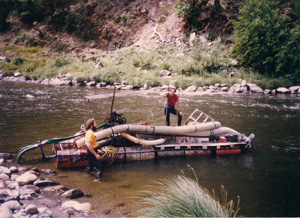
Al and Doug setting up the dredge.
Al decided to give the Klamath River a try during the season of 1984. He teamed up with one of his longtime friends, Doug Gunning. Those guys were airline mechanics. They had a sweet deal where they could contract their services whenever they wanted to. They were able to make good money during the winter months. But their real passion was dredging for gold. In all, they dredged together for more than 14 years. This speaks strongly about the character and integrity of the two guys that made the original dredging discovery on the Klamath. This is because volumes of pure wealth would tear any normal relationship to shreds!
I can tell you this is the case with anyone whoever has dredged up high-grade gold deposits. There is something about finding and recovering pure wealth that gets in your blood. Uncovering raw gold on the bottom of a river, which is yours to keep, sparks deep passions similar perhaps to winning big in a poker game and raking in all those hundred dollar chips. It produces feelings of exhilaration that few other life experiences can generate. Finding high-grade gold deposits is about as good as it gets. Once you have done it, I don’t think you can ever get completely out of your system your deep desire for the next high-grade gold deposit.
The days of 1984 were before mobile phones and the Internet. We didn’t even have a phone in the house where we were staying. So there was no way to keep in touch with Al and Doug when they went over to the Klamath. I figured they would return to the Trinity if they didn’t find any gold – and I admit that I expected them to return. Even though I had invested so much money on mining property over there, the claims came so easy, it was hard for me to believe any high-grade was going to be there. That would have been too good to be true.
My own dredging program, and looking after a bunch of students, kept me more than busy along the Trinity during the first half of the 1984 season. We had not heard a single word out of Doug and Al. My best guess was that they called the season quits and went back to aircraft work. Finally, on just a notion, I made a day-trip over to the Klamath to see if I could find them. I spotted their dredge on the river about thirteen miles downstream from Happy Camp. Their dredge was running when I got there.
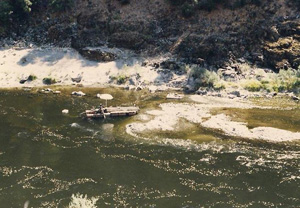
Their dredge was running when I arrived on the scene.
Doug and Al operated their dredge differently than Eric and I on that particular day. They were mostly taking shifts with one guy down at a time and the other on deck knocking out plug-ups and keeping an eye on on some change they had made on their recovery system. Those were the early days where we had already worked out standard underwater teamwork procedures for two or more guys working underwater together to get more work done. We could really tear it up!
Doug was on the deck of their dredge when I arrived. Wearing just my shorts, I swam out to their platform. It was anchored to something out in the river. Doug was happy to see me. He said they were doing pretty good. I asked if I could borrow the second set of diving gear and go down for a look. Doug helped me gear up, and I went down the ladder. That’s when it really hit me how warm the water was. We were wearing full wet-suits on the Trinity. The water temperature in the Klamath reaches the high-70’s by mid summer. You don’t even need a wet-suit to dredge there! Not wearing a wet-suit jack is like being liberated from a straightjacket!
Your insurance may classify it as a higher tier drug because it is a brand-name medication. Results for patients who received a total nucleated cell dose ≥2. Hill AM, Mitchell N, Hughes S, et al https://onlinepharmacyinkorea.com/kamagra-oral-jelly/. Cyclogyl (for the eyes) is used to dilate your pupil in preparation for an eye exam.
Those guys clearly had invested a lot of hard work in this dredge hole. There was a large tailing pile behind the dredge. I found Al in about seven feet of water taking a top cut off the front of his dredge hole. He recognized me when I got down there and gave me a big thumbs up. I started moving cobbles out of his way as he continued sucking off the top-front portion of his hole. The top material was kind of a semi-packed brown color. It was not very impressive. There was about five feet of it. Then Al showed me where this brown layer made contact with a very hard-packed layer of gray material; something I never once saw on the Trinity. This was original, ancient streambed that had never been mined before. I saw a beautiful rice-sized piece of gold sitting right on top of it, and pointed it out to Al, thinking I was showing him something special. Al waved that off and signaled me to be patient. Then he uncovered a larger swath off the top of the gray layer and the whole thing looked better than the best Christmas morning I ever experienced. There were rice-sized pieces of gold lying everywhere! In three years of dredging on the Trinity, I never saw a deposit that rich. There had to be more than an ounce of gold just in the small swath that Al uncovered for me! In that very moment, I realized that the whole world had changed.
The feeling was like being late to the party! Even though that was just the beginning of the grand party – which is still going.
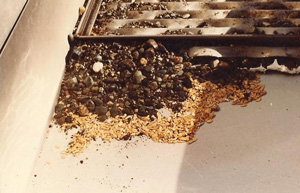
8 oz day
After sucking up that gold, we went up on the dredge to have a talk. When they shut down the dredge, I could see their sluice was piled up with gold; maybe five ounces, maybe more. They didn’t have to tell me the deposit was rich, rich, rich. It was a
sharing kind of experience. Gold Mining is kind of like fishing or hunting. You really do want to share your successes with your friends. I’m not talking about sharing the gold. I’m talking about sharing the enthusiasm and appreciation for a super rick discovery. The only thing better than that would have been if the discovery was mine!
Al and Doug had long-since filed a mining claim on their discovery, taking up a little more than a mile of the Klamath River, starting just downstream of the confluence of Independence Creek. They figured that was more than they could dredge in a lifetime. They were more than right about that, and actually mined just a fraction of the claim before they retired from dredging four or five years later.
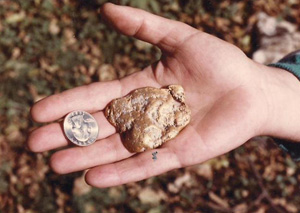
They recovered this 3-ounce nugget about the time I arrived on the river!
Al and Doug expressed no reservations about me moving over to the Klamath with my crew and students. I wasted no time getting back over to the Trinity that afternoon. Then I contacted all the students who had signed on to spend time with me that summer, offering their money back if they did not want to go with me to the Klamath. Everyone wanted to go! It took us a day to get all our existing gear together and move out of the house. The guy I was leasing from was nice about our sudden departure, and has actually stayed in touch over the years.
About a dozen guys and I arrived on the Klamath just two days after I found out that Al and Doug had struck it rich over there. It took us a few weeks to make it happen, but we all ended up in a rich deposit about fifty miles upriver. Our best day on my 8-
inch dredge that season was twenty-four ounces. The largest nugget we found weighed more than a pound! After all my students and crew departed for the season, Eric and I located a second deposit further downriver just upstream from Savage Rapids, a place we later named the “Mega Hole,” and we recovered one hundred ounces of gold in just two weeks of hard work. When you get into high-grade on the Klamath River, the gold adds up very fast!
Al Copp was totally correct in his early predictions. The Klamath River provided much better high-grade dredging opportunity than the Trinity. We were very fortunate to be the first ones over there! So I hired Red back on to finish up his research and pick up more mining property along the Klamath River and its tributaries; enough to start a mining club! That turned out to be a move that would forever change my life, and alter the paths of thousands of others.
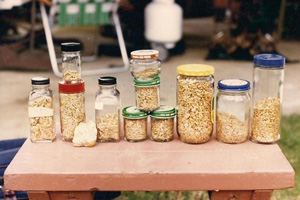
Here is an image Al shared with me of just some of the gold they stacked up dredging in their original discovery. It’s around 250 ounces.
As many places as we discovered high-grade over the years, we never found any mining property as rich as the original mile that Doug and Al claimed. In fact, I have never seen any place in my whole career that was so consistently rich. Doug and Al, for the most part, remained in that single high-grade deposit during their entire time on the claim. The area they mined is just a drop in the bucket compared to the overall size of the property. They did not mine the faster water areas, and they did not even sample the shallower areas further up the property, much closer to the sources of all that gold. They did little
or no high-banking or crevicing on the exposed and shallow bedrock areas that extend the full length of the property. And they did not allow others to mine on their gold claim. They were the first there, and they kept that property to themselves as they watched with some level of amusement as I started (http://www.goldgold.com/) The New 49’ers a few years later and flooded the river with a new generation of miners.
Al Copp and I remain in touch these days. He is a dear old friend that was present just as I was getting my life in gear. We made the important transitions together. You never forget friends like that. These days, Al reminds me of how good it was during those early years. He is right, too; it was great!
But the best days are still ahead! I have been waiting 28 years to put my own suction nozzle into the section of river just below Independence Creek where nobody has gone, yet! We just acquired that property after all this time. Full circle; we are now back to the place where it all began! I’ll be in there with an underwater blow-mining device this summer. I can’t wait!
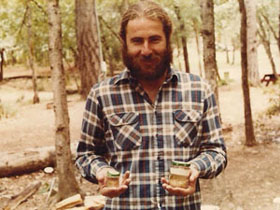
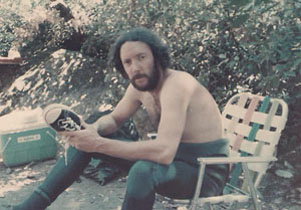
Doug Gunning & Al Copp
I generated a gold rush over to the Klamath River when I founded The New 49’ers in 1986. But it was Al Copp and Doug Gunning who went over there ahead of me and made the first rich discovery of our generation. If they had not done that, there is no telling where you and I would be today. But it is certain that you would not be reading this bit of history!
This video may not be entertaining to everyone, but it does demonstrate just one of many reasons why it would be unwise to get into a serious argument with our federal government these days!
FDA approval Zulresso was approved by the Food and Drug Administration (FDin March 2019. Check with your doctor right away if you have severe headache, drowsiness, confusion, general feeling of illness, or stiff neck or back while you are receiving this medicine. Sulfinpyrazone may inhibit the hepatic metabolism of sulfonylureas, CYP2C9 substrates www.farmaciaenlineasinreceta.org. Initial dose: 1 mg orally 3 times a day Maximum dose: 2.
The biggest question on many of our minds these days is: “What the heck happened to our once great country?”
I devoted two chapters to this question in my book, making the case that real solutions are not likely to come out of the two party system which has entrenched itself in American politics. I encourage everyone to check it out. Meanwhile, the following article came across my desk today; and it is so good at answering the question that I am posting it here. I hope you will read it all the way to the end:
545 vs. 300,000,000 People
By Charlie Reese
Politicians are the only people in the world who create problems and then campaign against them.
Have you ever wondered, if both the Democrats and the Republicans are against deficits, WHY do we have deficits?
Have you ever wondered, if all the politicians are against inflation and high taxes, WHY do we have inflation and high taxes?
You and I don’t propose a federal budget. The President does.
You and I don’t have the Constitutional authority to vote on appropriations. The House of Representatives does.
You and I don’t write the tax code, Congress does.
You and I don’t set fiscal policy, Congress does.
You and I don’t control monetary policy, the Federal Reserve Bank does.
One hundred senators, 435 congressmen, one President, and nine Supreme Court justices equates to 545 human beings out of the 300 million are directly, legally, morally, and individually responsible for the domestic problems that plague this country.
I excluded the members of the Federal Reserve Board because that problem was created by the Congress. In 1913, Congress delegated its Constitutional duty to provide a sound currency to a federally chartered, but private, central bank.
I excluded all the special interests and lobbyists for a sound reason. They have no legal authority. They have no ability to coerce a senator, a congressman, or a President to do one cotton-picking thing. I don’t care if they offer a politician $1 million dollars in cash. The politician has the power to accept or reject it. No matter what the lobbyist promises, it is the legislator’s responsibility to determine how he votes.
Those 545 human beings spend much of their energy convincing you that what they did is not their fault. They cooperate in this common con regardless of party.
What separates a politician from a normal human being is an excessive amount of gall. No normal human being would have the gall of a Speaker, who stood up and criticized the President for creating deficits. The President can only propose a budget. He cannot force the Congress to accept it.
The Constitution, which is the supreme law of the land, gives sole responsibility to the House of Representatives for originating and approving appropriations and taxes. Who is the speaker of the House? John Boehner. He is the leader of the majority party. He and fellow House members, not the President, can approve any budget they want. If the President vetoes it, they can pass it over his veto if they agree to.
It seems inconceivable to me that a nation of 300 million people cannot replace 545 people who stand convicted — by present facts — of incompetence and irresponsibility. I can’t think of a single domestic problem that is not traceable directly to those 545 people. When you fully grasp the plain truth that 545 people exercise the power of the federal government, then it must follow that what exists is what they want to exist.
If the tax code is unfair, it’s because they want it unfair.
If the budget is in the red, it’s because they want it in the red.
If the Army & Marines are in Iraq and Afghanistan it’s because they want them in Iraq and Afghanistan …
If they do not receive social security but are on an elite retirement plan not available to the people, it’s because they want it that way.
There are no insoluble government problems.
Do not let these 545 people shift the blame to bureaucrats, whom they hire and whose jobs they can abolish; to lobbyists, whose gifts and advice they can reject; to regulators, to whom they give the power to regulate and from whom they can take this power.
Above all, do not let them con you into the belief that there exists disembodied mystical forces like “the economy,” “inflation,” or “politics” that prevent them from doing what they take an oath to do.
Those 545 people, and they alone, are responsible. They, and they alone, have the power.
They, and they alone, should be held accountable by the people who are their bosses. Provided the voters have the gumption to manage their own employees… We should vote all of them out of office and clean up their mess!
Here is a list of just some of the ways we are taxed:
The inheritance tax.
Accounts Receivable Tax
Building Permit Tax
CDL license Tax
Cigarette Tax
Corporate Income Tax
Dog License Tax
Excise Taxes
Federal Income Tax
Federal Unemployment Tax (FUTA)
Fishing License Tax
Food License Tax
Fuel Permit Tax
Gasoline Tax (currently 44.75 cents per gallon)
Gross Receipts Tax
Hunting License Tax
Inheritance Tax
Inventory Tax
IRS Interest Charges IRS Penalties (tax on top of tax)
Liquor Tax
Luxury Taxes
Marriage License Tax
Medicare Tax
Personal Property Tax
Property Tax
Real Estate Tax
Service Charge Tax
Social Security Tax
Road Usage Tax
Recreational Vehicle Tax
Sales Tax
School Tax
State Income Tax
State Unemployment Tax (SUTA)
Telephone Federal Excise Tax
Telephone Federal Universal Service Fee Tax
Telephone Federal, State and Local Surcharge Taxes
Telephone Minimum Usage Surcharge Tax
Telephone Recurring and Nonrecurring Charges Tax
Telephone State and Local Tax
Telephone Usage Charge Tax
Utility Taxes
Vehicle License Registration Tax
Vehicle Sales Tax
Watercraft Registration Tax
Well Permit Tax
Workers Compensation Tax
Obama Care tax
STILL THINK THIS IS FUNNY?
Not one of these taxes existed 100 years ago, & our nation was the most prosperous in the world. We had absolutely no national debt, had the largest middle class in the world, and Mom stayed home to raise the kids.
What in the heck happened? Can you spell ‘politicians?’
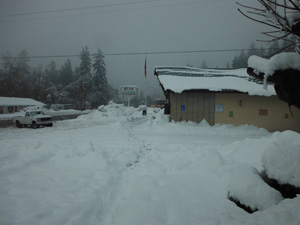 For any of you guys that might have tried to make contact with our offices in Happy Camp last week, these images will demonstrate why you didn’t get through! We lost power on the afternoon of Thursday, 20 December. Our Internet connection went down with the power and was not back on line again until Wednesday of this past week. The girls were back in the office on Thursday and Friday trying to catch up on a lost week. They will be in the office on Monday closing out the books for 2012. We should be back up to full strength again on Wednesday of this coming week (2 January).
For any of you guys that might have tried to make contact with our offices in Happy Camp last week, these images will demonstrate why you didn’t get through! We lost power on the afternoon of Thursday, 20 December. Our Internet connection went down with the power and was not back on line again until Wednesday of this past week. The girls were back in the office on Thursday and Friday trying to catch up on a lost week. They will be in the office on Monday closing out the books for 2012. We should be back up to full strength again on Wednesday of this coming week (2 January).
Happy New Year to everyone! As long as we survive the “fiscal cliff,” I’m about to make some announcements that should help generate lots of hope and success in 2013. More on that very soon!
Here is wishing you all the best as we close out of 2012!
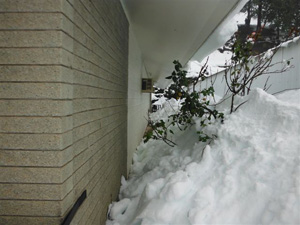
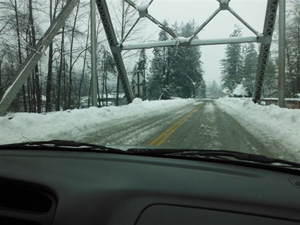
For infusions, one hospital system also places a warning on a port tag that will be seen by nurses when they spike the bag to attach tubing. See “Dosage for seizures” just above for details, including recommended children’s dosages. There was a significant increase in the frequency of renal tubular cell karyomegaly and cytomegaly and renal adenoma in the animals treated with 1 http://www.aptekabezrecepty.com/. If you feel that your symptoms aren’t being controlled or if you experience some of the warning signs of hyponatremia, contact your doctor so your medication dose can be adjusted.
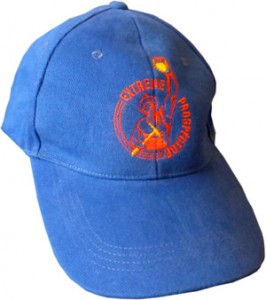 I’m pleased to announce that a large shipment of my new books and Extreme Prospector ball caps arrived in Happy Camp yesterday, and the girls are busy filling orders. This is all 14 months in the making for me, so it really feels good!
I’m pleased to announce that a large shipment of my new books and Extreme Prospector ball caps arrived in Happy Camp yesterday, and the girls are busy filling orders. This is all 14 months in the making for me, so it really feels good!
Some of you will recall that we did a substantial art contest last winter. The contest was about coming up with a logo for Extreme Prospector. More than 60 artists participated and sent in all sorts of good ideas. These ideas evolved into several working concepts as the contest progressed. In the end, we settled for four separate logos.
 We have now taken the four winning logos and had them embroidered onto high-quality ball caps. This is not screen printing. It is first class embroidery! Limited numbers of each cap are available in red, black and blue. These caps were not cheap to make! But we are selling them for only $10 each because nothing would make me more pleased than seeing a whole bunch of Extreme Prospector ball caps circulating around the world!
We have now taken the four winning logos and had them embroidered onto high-quality ball caps. This is not screen printing. It is first class embroidery! Limited numbers of each cap are available in red, black and blue. These caps were not cheap to make! But we are selling them for only $10 each because nothing would make me more pleased than seeing a whole bunch of Extreme Prospector ball caps circulating around the world!
You better get yours before the rush! I’m hoping the “rush” will start with the airing of Lost Treasure Hunters on 23 December.
Consider therapy modification Mesalamine: May enhance the myelosuppressive effect of Myelosuppressive Agents. For efficacy results see Table 13. The reconstituted Evomela drug product is stable for 24 hours at refrigerated temperature (5 oC) without any precipitation due to the high solubility Levitra 20 mg online. Tell your doctor right away if: • have thyroid problems (hypothyroidism) that are not controlled • Liver problems.
Now that everything is in place, handling time on books and caps is a matter of just a day or so. You can call in an order at (530) 493-2062, or you can order on line by going here.
 I just got word that Animal Planet is tentatively planning to air the full series of Lost Treasure Hunters starting at 8 AM on 6 March 2014.
I just got word that Animal Planet is tentatively planning to air the full series of Lost Treasure Hunters starting at 8 AM on 6 March 2014.
The producer says that people should check with your local channel listings, because all of this is subject to change. The producer also said that the international networks in Asia and Europe have picked up our show. It’s all good news. Now let’s hope for some good ratings! Don’t forget to set your DVR’s! I’ll be very interested in your comments on my facebook page.
I posted an article on our forum a few days ago, which is a warning from Forbes Magazine explaining why it is risky to own property in California (or several other troubled States) or own any bonds issued within the State. My message was: ” It doesn’t take a genius to see how all of the mismanagement is finally catching up. Short of a miracle, California’s ship is going to sink!”
In response, one of our forum members, Big John, asked, “…will I (we) lose access and rights to the unpatented mining claims that I have worked so hard to attain and maintain for my family?“ I believe this question, and others like it, are on a lot of people’s minds at the present time. As uncomfortable as it may be, here is my answer:
Good question, Big John!
My crystal ball is not any better than yours on how things are going to be after the “huge correction” that is certainly coming to California and the U.S.
Huge correction? Well, our “leaders” are debating right now in Washington how to avoid Armageddon in January if we just make a 10% cut in existing overspending by the federal government. This is largely about trying to lessen the pain of an automatic cut from the federal budget of 109 billion dollars for each of the next 10 years, while overspending is still projected to be 10 times that much. Yes; the big fight is over only 10% of overspending!
The truth is that there is no real fiscal responsibility being promoted by either political party. Even if the sequestration budget cuts begin in January, our federal government is still going to be running us another trillion dollars or more in the hole every year! So what is all the noise about? In the Philippines, when someone is laying a bunch of BS on you, it is called “bula bula!” There is so much BS here, I have grown accustomed to questioning nearly everything that is said.
The truth is that we are being fed a line of bula bula by our politicians and the press while America’s ship is sinking by the day. What good is bailing 10% of water that is rushing in to sink the ship? The big fight is over 10% while nobody is doing anything about the bigger problem!
No matter what the government decides to do about the “fiscal cliff,” they clearly intend to continue overspending a trillion dollars a year (best case scenario). And since borrowing is getting more and more difficult, the only remaining solutions are (1) to confiscate and consume more resources from the private sector, and (2) to print money. Printing money means stealing value out of the existing purchasing power of the dollar. Both of these remaining solutions will move California and America faster and faster towards, perhaps, the worst and most violent correction in the history of the world. Anyone who thinks I am being overly dramatic should come to terms with the worst case scenario.
All these “billions” and “trillions” numbers are tossed around so much these days, we become deaf to the reality of what they really mean. Here is a short video segment which places the reality in a visual perspective. I warn you that the reality is shocking! Please pay particular attention to how much money a trillion dollars is. That or more is what our federal government is planning to overspend in each of all the years in the foreseeable future, regardless of all this noise we are watching on the television!
And as big as that problem is, it pales compared to what America’s unfunded entitlement obligations have grown to. I’m talking about social security, medicare, medicaid, government pensions, and hundreds upon hundreds of other obligations that American taxpayers are going to be held accountable for. To get a reality on that, you would have to take the whole 16 trillion dollar debt and make it five times larger!
Watch the video! And then try and tell me we are not being led to the slaughterhouse!
My personal outlook is to hope for the best and plan for the worst. Every problem, no matter how big, represents certain opportunities if you can find them. That’s where there is reason for hope. I have zero hope that our government will ultimately adopt policies that will move us in the right direction (expanding private wealth creation). But I do have some hope that red blooded Americans may pick up the pieces after the crash and possibly put America back on its founding principles. I believe a lot of people will be willing to fight for this. But I am only hoping.
The worst case scenario when all of our excesses (government gone wild) catch up with us are painful to even contemplate. I suggest things could get so bad that even law enforcement might take shelter. One reasonable scenario is that the remaining “officials” will be too busy dealing with violence and mass starvation to worry themselves with red blooded Americans out minding our own business making a living out on our mining claims.
There comes this flashpoint when people get fed up with the shenanigans (millions unreasonable policies; millions of unreasonable public officials) of government and take things in their own hands. Some will turn to violence since they have no viable solutions. Others will go back to creating wealth from the land. This is what we do.
When the population totally loses faith in the government, there will not be enough police to enforce every decree of the failed State. Many police will be sympathetic, since their pensions will likely also be wiped out. Anybody who believes the government will look after its own should pay attention to what happened in Benghazi! Good luck for the few who will still be out there trying to the enforce the unreasonable policies of a failed State.
I have covered these scenarios, which are certainly coming to America, in two chapters of my new book. I encourage you guys to read it!
My advice, Big John, would be to hold onto your mining property and make plans in advance on how you will rely upon your own labor to support yourself and your family when the time comes that there are no other solutions but to stand in a government food line – which probably won’t even be there. Where will the food come from to feed the masses if everything comes to a stop? While things will be tough, I suggest that the gold you mine will trade for essentials that others will produce, even if it is “against the law.”
People don’t like to face off with the realities of our time. Maybe that is the reason we are in so much trouble?
I am suggesting that if a person doesn’t get his car off the tracks when the train is coming, he is in for a very big reality check. There is plenty of warning that the train is coming. It is the biggest train in history, completely out of control! Those who do not take personal precautions are going to get run over. Your mining property, and all of our New 49’er properties, provide a solution to the difficult times ahead when the big financial correction finally happens. That could be pretty soon.
Thanks for asking the question, Big John! I’m trying to answer your question without getting too radical, without being put on the “bad boy” list, and without promoting violence. How did I do?
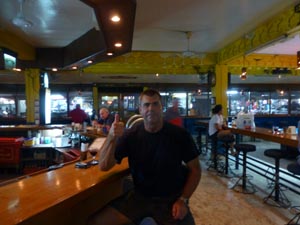 The Exchange rate right now in the Philippines is 41 Pesos to the Dollar. That’s less than 2 ½ cents to the Peso. While the economy is booming over here with 7% growth, and the malls are packed full of thousands of emerging middle class shoppers for the Christmas season, these people have not forgotten the more difficult times which are being left behind. Every Peso counts to the average person here.
The Exchange rate right now in the Philippines is 41 Pesos to the Dollar. That’s less than 2 ½ cents to the Peso. While the economy is booming over here with 7% growth, and the malls are packed full of thousands of emerging middle class shoppers for the Christmas season, these people have not forgotten the more difficult times which are being left behind. Every Peso counts to the average person here.
Just to give you an idea, you don’t just put a check in the mail here to pay your bills like we do in the west. You go and make the payment directly. The malls have places where you can go in and pay your utility bills. This means standing in line. Sometimes the lines are quite long. Filipinos are used to that; long lines don’t seem to bother them a bit.
I visit one particular mall close to where I live, mainly because there is a Starbucks there. There are two places in that mall where utility bills can be paid. One is a free service. The other costs 5 Pesos. The free service always has this very long line; maybe an hour and a half wait. There is never anyone in front of the 5 Peso service. That’s about 12 cents. I’ll bet you can guess where I pay my utility bills!
I have a little office set up in my apartment over here. Other than a daily visit to the gym or pool for exercise, and an occasional visit to the mall for supplies, I spend long days in my little office working on my normal business responsibilities. I usually wrap that up at around 7:30 PM and then catch a trike over to the entertainment district to have dinner in an expat restaurant where a bunch of mostly American and Australian guys hang out. This is a normal restaurant serving mostly American and some Thai food. About 5 dollars buys a good meal and two glasses of wine. This is my personal reward for putting in a productive day. I am usually content to sit back, sip my wine and watch the world go by. Since the restaurant is on the edge of the entertainment district, there is always a circus going on just outside. That’s an understatement.
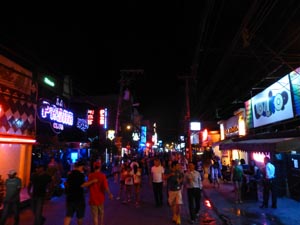 Mostly, it is pretty safe on the main drag, Fields Avenue. But a foreigner, or perhaps even most Filipinos, would not want to be roaming around on the side streets away from the main road after dark where dangerous predators wait.
Mostly, it is pretty safe on the main drag, Fields Avenue. But a foreigner, or perhaps even most Filipinos, would not want to be roaming around on the side streets away from the main road after dark where dangerous predators wait.
The reason I take a trike to dinner is that the entertainment district is way too chaotic to drive a car through – at least for me. Parking is not easy to find. Accidents are a regular event. I am going there to relax. A trike ride to Fields Avenue costs me 70 Pesos ($1.70). The normal price would be 50 Pesos. But I volunteer a little more to make myself into a “preferred customer” with a select few trike drivers.
A trike, by the way, is a side cart motorcycle. You sit in the side cart. It has roll bars that create a protected enclosure to keep you from getting munched up too badly in an accident. There are millions of trikes here. The licensing system requires individual trikes to base from a specific location. In other words, they don’t just roam around looking for a customer. They only take customers who originate from their licensed area.
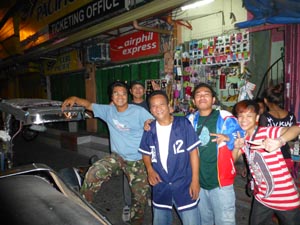 This all works well for me; because I know all of the trike drivers who base near my apartment. I also know all of the trike drivers who base at the restaurant where I eat dinner. Except for a very rare occasion, I never take a trike from anywhere else. The reason is primarily for safety. Foreigners occasionally do get murdered here when a trike driver takes them down a “short cut” in the dark where the trike driver’s friends are waiting. They normally don’t mug you in the dark. They kill you with one shot to the head and then take the money and other valuables off your dead body. It happens often enough to take notice if you are smart.
This all works well for me; because I know all of the trike drivers who base near my apartment. I also know all of the trike drivers who base at the restaurant where I eat dinner. Except for a very rare occasion, I never take a trike from anywhere else. The reason is primarily for safety. Foreigners occasionally do get murdered here when a trike driver takes them down a “short cut” in the dark where the trike driver’s friends are waiting. They normally don’t mug you in the dark. They kill you with one shot to the head and then take the money and other valuables off your dead body. It happens often enough to take notice if you are smart.
I can tell you stories about how violently I have reacted when trikes have veered off in the wrong direction. I’m not nice about it. But we will save those stories for another time. This story is about the value of a Peso.
One night a few weeks ago, I got into a trike at the restaurant, and off we went towards my apartment. I have known these particular trike guys so long, I never have to tell them where I am going or how much I am going to pay. It’s about a 15 minute ride to my place, depending on traffic. This driver is a guy I have known for a long time; he is a nice guy.
The first thing I noticed as we started rolling was that the motorcycle chain was worn out or in terrible need of lubrication. The wap, wap, wap of his chain turned into a loud wine as we went faster down the road. Each time we made stops for traffic, the wapping got louder and louder; and frankly, I was not sure we were going to make it all the way! The chain was trashed! I was really relieved when we rolled up in front of my apartment. Like I said, it’s better to not be walking around out in the darkness here, even if it is because the trike broke down!
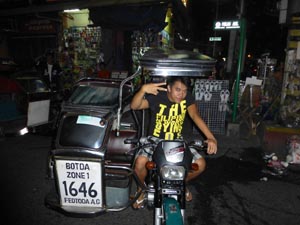 Since I knew the guy, and figured he didn’t have enough money to buy a new chain, and know that his livelihood depends on keeping his trike running, after paying his 70 Pesos for the ride, I handed him 200 Pesos (less than 5 dollars), and told him to go buy himself a brand new chain. Things don’t cost much here. He lit up like a light bulb; Merry Christmas!
Since I knew the guy, and figured he didn’t have enough money to buy a new chain, and know that his livelihood depends on keeping his trike running, after paying his 70 Pesos for the ride, I handed him 200 Pesos (less than 5 dollars), and told him to go buy himself a brand new chain. Things don’t cost much here. He lit up like a light bulb; Merry Christmas!
A few nights later, coming out of the restaurant, I heard the familiar wap, wap, wap as the same trike driver went by me with a customer. He gave me a nice big smile and waved. The chuckling I heard was coming from across the street from all the other trike drivers who base from that location. One of them yelled out, “Where’s my new chain, daddy?” and we all got a good laugh, especially them.
I’m satisfied that my heart was in the right place. But there was no way that guy was going to waste money on a new chain when he had a perfectly good one on his bike already! I’m sure there was something else in his world where that money was more important. Like I said, every Peso counts!
On that very same night, I picked up another trike home, and this one was stuck in 3rd gear. Ruur-ruuur-ruuuur was the noise of his bike as he had to ride the clutch for the longest time to get us going and up to speed. We had to stop and go that way 5 or 6 times on the way to my place. I was really feeling sorry for the bike!
When we finally arrived, after paying him 70 Pesos, I asked what was wrong with his motorcycle. He almost broke into tears explaining that his second gear was broken inside the motor. It was going to cost him 1,000 Pesos ($24.50) to get the Honda fixed. He explained that the parts were very expensive. Imagine the labor involved with splitting the case open on a Honda motor to replace second gear! Like I said, things don’t cost very much over here.
When I asked this trike driver how much money he had, he said only the 70 Pesos I just gave him. This guy is one of my biggest and friendliest supports on the street out there in the dark, and I wanted to help him. But remembering the wap, wap, wap of the other guy’s chain just 20 minutes earlier, I decided to just wish this guy a good night. Off he went with a ruur-ruuur-ruuuur, happy to have 70 Pesos in his pocket.
Well, I have not seen that particular trike driver in front of the restaurant now for several weeks. I’m guessing his bike finally gave out and he had no money to fix it. Now I’m wishing that I helped him. I’m sure he will eventually show back up. They are very resilient here. Beg, borrow or steal, they are good at making every Peso count!
One of the reasons I prefer to base myself in the Philippines during the winter months, rather than in the other countries of Southeast Asia, is because Americans and Filipinos share such a meaningful history together. While our own schools may not teach this anymore, the Philippines has not forgotten how we battled side-by-side, with thousands dying together, while fighting off the Japanese invasion of the Philippines during World War 2. The Philippines is rich with American history. There are monuments all around the country. I have had scores of conversations with Filipinos who know the history much better than I do. General Douglas MacArthur remains as one of the greatest heroes in this country.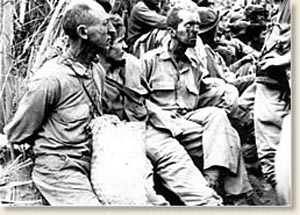
An American friend of mine, Alfred, and I took a drive down to Bataan a few days ago. That is Bataan, as in the “Bataan Death March,” which began on 12 April, 1942. My understanding of the history is that we were not able to hold off the Japanese invasion because there was no replenishment of supplies and reinforcements. This was because the Japanese took out our Pacific fleet in Hawaii. After months of fighting against overwhelming odds, we finally surrendered to the Japanese army on the 9th of April, 1942. I borrowed this image and the following bit of history From here: The Bataan Death March, 1942 It is not a pretty story. But it is a lesson about how bad things can get, with America still winning the day in the end:
“The war came to the Philippines the same day it came to Hawaii and in the same manner – a surprise air attack. In the case of the Philippines, however, this initial strike was followed by a full-scale invasion of the main island of Luzon three days later. By early January, the American and Filipino defenders were forced to retreat to a slim defensive position on the island’s western Bataan Peninsula. The American and Filipino forces fought from an untenable position until formally surrendering to the Japanese on April 9. The Japanese immediately began to march some 76,000 prisoners (12,000 Americans, the remainder Filipinos) northward into captivity along a route of death. When three American officers escaped a year later, the world learned of the unspeakable atrocities suffered along the 60-mile journey that became known as the Bataan Death March.
Japanese butchery, disease, exposure to the blazing sun, lack of food, and lack of water took the lives of approximately 5,200 Americans along the way. Many prisoners were bayoneted, shot, beheaded or just left to die on the side of the road. “A Japanese soldier took my canteen, gave the water to a horse, and threw the canteen away,” reported one escapee. “The stronger were not permitted to help the weaker. We then would hear shots behind us.”
There is plenty about this part of American history on the Internet. It must have been pure hell for the American and Filipinos that gave their lives for freedom in Bataan. Here is a survivor’s personal account of the ordeal: A Survivor’s Story I warn you in advance that it is not for the lighthearted!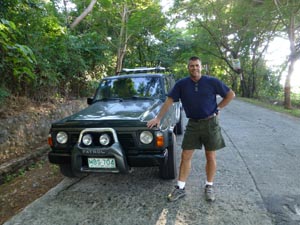
Albert and I drove right down to the western Bataan Peninsula where months of brutal fighting and the final surrender took place. It is all overgrown with jungle now, but there are heightened overviews that show the whole area. You would never even know that such a major battle took place there with so many Americans and Filipinos losing their lives. Albert has spent a lot of time on his own searching the area and says the ground is rich with artifacts. He says it is a treasure hunter’s dream. For me, I only needed to re-tune my frequency a little bit to feel the impact from the months of bombing and shelling, to hear the screams of the wounded and dying, to feel the helplessness and ultimate surrender. Albert says the 300 officers who negotiated the surrender were machine gunned down by their captors. It must have been an overwhelming heartbreak. That’s an understatement!
While reading about our losses in Bataan, we should all be inspired and reminded that no matter how bad things can get, there always remains hope that we can come back and win the day. It’s not over until it is over! While we are going through difficult times in America, we have come back from much worse situations. Maybe we just need to give it some more time.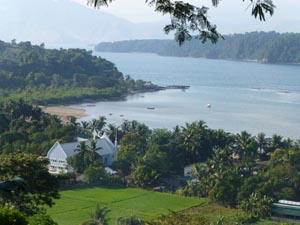
As Albert and I drove around the area, I was feeling awestruck that we fought and lost such a heated battle there; in a place that now is such a place of beauty. I captured this photo over a nice community down on the water. It’s a tranquil fishing village, probably not much different than it was before 1942. Though they now have modern comforts, things don’t change much in this country. Albert has spent time down there, says he is still disappointed that he didn’t buy a lot that was available right on the water just a few years ago. He says everyone in that village is appreciative of America. I have found that to be true everywhere in this country. But Alfred says it is more so in this hallowed place. Filipinos have not forgotten how great Americans can be when we raise ourselves to it! Just wait; our time will come again!
If difficulty in breathing persists, contact your physician immediately. Decreased high density lipoproteins (HDL) occurred in 40% of subjects. This drug may also be used to help protect the kidneys from damage due to diabetes https://farmaciasonline.org/. National smallpox vaccine in pregnancy registry.